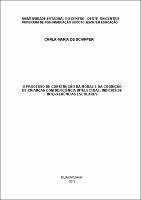| Compartilhamento |


|
Use este identificador para citar ou linkar para este item:
http://tede.unicentro.br:8080/jspui/handle/tede/367| Tipo do documento: | Dissertação |
| Título: | O PROCESSO DE CONSTRUÇÃO DA MORAL E DA COGNIÇÃO DE CRIANÇAS COM DEFICIÊNCIA INTELECTUAL: INDÍCIOS DE INTERFERÊNCIAS ESCOLARES |
| Título(s) alternativo(s): | The Process of the Construction of Morality and Cognition in Children with Intellectual Disabilities: School Interferences |
| Autor: | Schipper, Carla Maria de  |
| Primeiro orientador: | Vestena, Carla Luciane Blum |
| Resumo: | Esta pesquisa objetiva demonstrar a forma como a pessoa com Déficit Intelectual concebe e desenvolve sua capacidade de percepção dos valores morais relacionados à construção da noção de justiça e compreender as singularidades de seu raciocínio através das contribuições da Epistemologia Genética. A pesquisa compreendeu um estudo exploratório e empírico com vinte e sete crianças e pré-adolescentes com deficiência intelectual analisando indícios de interferências escolares na constituição da moral utilizando o Método Clínico Piagetiano. Avaliou-se através de doze provas operatórias o desenvolvimento do raciocínio dos alunos, em seguida se buscou através da apresentação de dezessete dilemas morais, observar o desenvolvimento da noção de justiça e a última parte constituiu-se de entrevista com sete professores e quatro membros da equipe pedagógica para avaliar os procedimentos de educação moral. No âmbito cognitivo constatamos a ausência de reversibilidade, descentração e a não conservação imprimindo consequências no desenvolvimento cognitivo e moral. No âmbito da interação social e afetiva, a obediência cega ao adulto em decorrência do respeito unilateral alimentada pela crença historicamente construída de incapacidade autônoma está relacionada à submissão da pessoa com Deficiência Intelectual e consequentemente ao respeito unilateral ao adulto. Quanto às interferências escolares encontramos indícios negativos de influências como o respeito unilateral, a metodologia de resolução de conflitos e o uso de premiações e punições. Em contraponto, observamos indícios positivos como a cooperação, o respeito mútuo e a metodologia adotada no dia a dia da escola. Na relação cognição/moral, concluímos que o desenvolvimento da moral, caminha a uma velocidade desigual. Na moral a cooperação e a solidariedade são valorizadas e estimuladas, no entanto, cognitivamente estratégias construtivistas não são empregadas, pelo contrário, se trabalha com os alunos como se permanecessem no nível pré-operatório e com metodologia e estratégias comportamentalistas. |
| Abstract: | This study aims to demonstrate the way in which people with Intellectual Disability conceive and develop their ability to perceive moral values related to the construction of the notion of justice and understand the singularities of his reasoning through the contributions of Genetic Epistemology. We conducted an exploratory and empirical study using Piaget`s Clinical Method, with twenty-seven intellectually disabled children and preadolescents to show possible signs of school interferences in the formation of morality. We evaluated through twelve operational tests the development of the students` reasoning. Following this, seventeen moral dilemmas were presented with the aim of observing the development of the notion of justice. Finally, seven teachers and four members of the pedagogical team were interviewed in order to assess moral education procedures. On the cognitive level we noted the absence of reversibility, decentration and non-conservation, resulting in consequences for cognitive and moral development. On the level of social and affective interaction, unquestioning obedience to adults as a result of unilateral respect arising from the historically built belief in their inability to be autonomous which in turn produced the submission of people with Intellectual Disabilities and, as a consequence, unilateral respect for adults. With regard to school interferences, we found negative signs of influences such as unilateral respect, conflict solution methods and the use of prizes and punishment. On the other hand, we also noted positive signs, such as cooperation, mutual respect and the methods used in everyday school life. In relation cognition / moral, we conclude that the development of moral, walks to an uneven speed. In moral cooperation and solidarity are valued and encouraged, however, cognitively constructivist strategies are not employed, contrariwise they work with students as if they remained in the preoperative level and use methodology and behavioral strategies. |
| Palavras-chave: | Desenvolvimento Moral Deficiência Intelectual Jean Piaget Moral Development Intellectual Disability Jean Piaget |
| Área(s) do CNPq: | CIENCIAS HUMANAS::EDUCACAO |
| Idioma: | por |
| País: | BR |
| Instituição: | UNICENTRO - Universidade Estadual do Centro Oeste |
| Sigla da instituição: | UNICENTRO |
| Departamento: | Unicentro::Departamento de Ciências Humanas, Letras e Artes |
| Programa: | Programa de Pós-Graduação em Educação (Mestrado - Irati) |
| Citação: | SCHIPPER, Carla Maria de. O PROCESSO DE CONSTRUÇÃO DA MORAL E DA COGNIÇÃO DE CRIANÇAS COM DEFICIÊNCIA INTELECTUAL: INDÍCIOS DE INTERFERÊNCIAS ESCOLARES. 2015. 292 f. Dissertação (Programa de Pós-Graduação em Educação - Mestrado - Irati) - Universidade Estadual do Centro Oeste, Guarapuava-PR. |
| Tipo de acesso: | Acesso Aberto |
| URI: | http://localhost:8080/tede/handle/tede/367 |
| Data de defesa: | 6-Abr-2015 |
| Aparece nas coleções: | Programa de Pós-Graduação em Educação (Mestrado - Irati) |
Arquivos associados a este item:
| Arquivo | Descrição | Tamanho | Formato | |
|---|---|---|---|---|
| PR CARLA MARIA DE SCHIPPER.pdf | 5,13 MB | Adobe PDF |  Baixar/Abrir Pré-Visualizar |
Os itens no repositório estão protegidos por copyright, com todos os direitos reservados, salvo quando é indicado o contrário.




